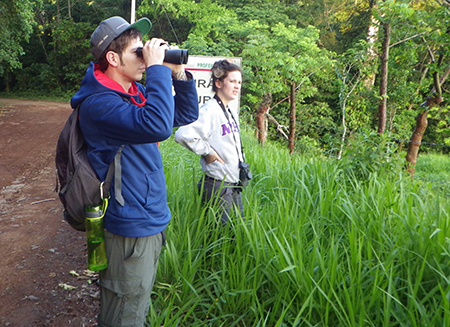Research Trip Inspires Graduate’s Interest in Pursuing Ph.D.

Highlands biology masters graduates José Griego, left, and Casey Taylor observe tropical wildlife in Los Tuxtlas Biosphere Reserve in Veracruz, Mexico.
Las Vegas, N.M. — A field class at the Los Tuxtlas Biosphere Reserve in Veracruz, Mexico solidified New Mexico Highlands biology graduate José Griego’s interest in pursuing a doctorate in wildlife biology.
“This tropical ecology field class was like a fairy tale for an aspiring wildlife biologist because the biodiversity was so extreme, in large part due to much more plentiful water,” Griego said. “It was incredible to apply our classroom and book knowledge of ecosystems first-hand in a tropical rainforest. One of the most significant differences in the tropical ecosystem was how the plants competed for sunlight because of the density of the jungle.”
The 24-year-old Las Vegas native earned his master’s in biology in May. His thesis examined the population genetics of native northern leopard frogs at the Rio Mora National Wildlife Refuge and native plains frogs from the Sapello River, both in Northeastern New Mexico.
Sarah Corey-Rivas and fellow biology professor, Jesíºs Rivas, took Griego and nine other upper-division and graduate biology students on the two-week tropical field class to the reserve in May. Corey-Rivas was Griego’s thesis adviser.
“This kind of research is important because it can be used to help make informed management decisions for declining populations like the native leopard frog in New Mexico. Population genetics is also important for reintroducing species,” Griego said. Griego said he wants to focus on population genetics research at the doctoral level.
“This tropical ecology field class with Dr. Corey-Rivas and Dr. Rivas was the trip of a lifetime,” Griego said. “Their expertise and passion made me more passionate about these subjects.”
“The idea for this field course was for our students to compare the tropical ecosystem with our temperate, drier ecosystem in New Mexico and to understand the important unifying ecological principles of both ecosystems,” Rivas said. “For example, both ecosystems have trophic systems, which are food webs and feeding relationships among wildlife. The tropical ecosystem, however, is much more diverse and complex than our ecosystem here in New Mexico.
“We examined the role of herbivores and top predators in regulating the tropical ecosystem. For instance, because the jaguar is extinct in Los Tuxtlas reserve, there is an overabundance of smaller predators like raccoons,” Rivas said.
Corey-Rivas said the long drive to Veracruz was itself a learning experience.
“Because we drove three days to get to Veracruz, we all appreciated our geographic connection to Mexico much more,” Corey-Rivas said. “It was fascinating to connect the ecology in Mexico with the deep history and culture like the ancient Aztec temples. We gained a greater appreciation for the mystery of the ancient wildlife that were alive in Aztec times and still thrive in the jungle.”
The class also stayed at an organic farm on a lagoon to learn how the local people find ways to live sustainably in a jungle biosphere.
Other Highlands University biology students from the tropical ecology field class included undergraduates Octavio Ayala, Nicasio Gonzalez, Erin Hagen, Rose Peralta, Gabriel Skees, Son Tran, and Gabrielle Vigil. In addition to Griego, other biology graduate students who participated included Casey Taylor and Lisa McBride.
“Our students had the opportunity to make contact with Mexican scientists at the research station in Veracruz,” Rivas said. “We hope this will open up future research collaborations.”
The Highlands University Foundation, along with the Biology Department and student senate, helped fund the trip.
